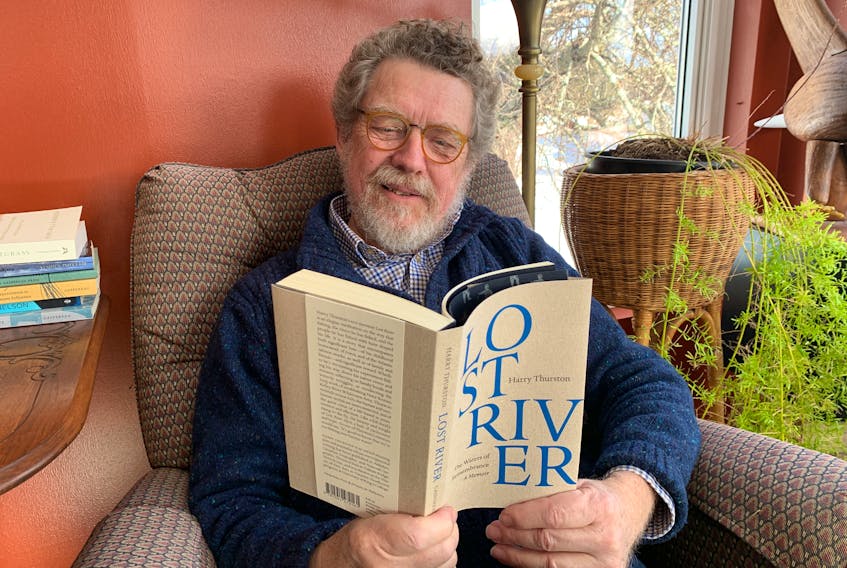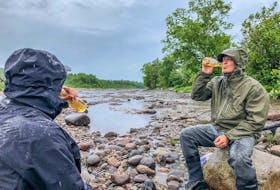TIDNISH BRIDGE - Growing up in rural Yarmouth County, Nova Scotia poet and environmentalist Harry Thurston developed a close relationship with the river near his home and the hours spent on the water fishing rod in hand, first with his dad and then brother.
After 27 books, countless short stories, poems, and articles dating back five decades, it was only a matter of time before Thurston looked back on his life and collected his thoughts in a memoir. The book recognizes his commitment to this area’s natural beauty and his work - and that of others - to protect Nova Scotia’s landscape for future generations.
Lost River: The Waters of Remembrance, A Memoir is a 208-page eco-memoir printed by Gaspereau Press and described as an “elegiac meditation” on the way that fishing, the rivers he has fished, and the people he fished with helped shape his life.
“It’s framed by my lifelong passion for fishing,” Thurston said. “It’s a family story. It’s a story about my father and my brother, who were my closest fishing buddies - my father in my childhood and my brother in my adulthood.”
Thurston said his father died when he was young, while his older brother, Gary, died prematurely in 2015 and during his formative years the river he fished as a child - before going to school - was polluted by the construction of the Yarmouth airport.
“As the title says, it’s a book about loss,” he said. “There’s another element in the book, which is about the loss in the natural world.”
Thurston said fishing is a metaphor for the creative process and has been a way for him to be in the natural world and connecting to its beauty and mystery.
The first part of the book deals with his early life and fishing with his dad while the third part is about his brother. The middle section, he said, is about the struggle to get added protection for the Chignecto Game Sanctuary in Cumberland County. That section of the book is about his life in Cumberland County - first near the sanctuary in River Hebert and later becoming an activist living along the Tidnish River.
He believes it’s important for people to feel a connection with the world around them and develop some sort of appreciation with the land and the creatures within those habitats.
“I think people have a very fundamental connection to the natural environment. What they don’t appreciate is how fragile it is,” Thurston said. “There has been a steady attrition since the middle of the last century. The deterioration of the environment has accelerated for a number of reasons. I think people are connected to a place and the beauty of the natural world around them, but maybe don’t understand what that involves.”
It's also a book that didn’t happen overnight. Thurston said he wrote the first 500 words about his father 25 years ago while at a hotel in Sydney. He expanded on it 15 years later for inclusion in the Nova Scotia Book of Fathers published in 2016.
He continued writing about fishing and then creation of the Kelley River Wildereness Area occurred, then his brother fell ill and died.
He said by protecting the River Hebert and the Kelley River, the new wilderness area in Cumberland County not only protects these rivers for the future, preserving a vital habitat, but it also protects a “beautiful place to go trout fishing.”
He said there aren’t many areas of that size left in the province that haven’t been developed. In fact, that was the only intact area over 20,000 hectares left in the province to protect, he said. “There was opposition to protecting it, but the irony is the people of the county have a long relationship with that landscape and in the end, snowmobilers are still using it and I’m still going out in the spring fishing. The thing that attracted us, Cumberland Wilderness, to the area was the fact it was relatively untouched and that’s still true today and will be true in the future. It’s a real legacy.”
Cumberland Wilderness then turned its attention to convincing the province to protect more of the Isthmus of Chignecto northeast of Amherst toward his Tidnish Bridge home. If the land bridge is severed it would have an irreparable impact on species in northeastern North America.
“It’s worth protecting because if we don’t, we will lose species,” he said.
A wilderness area has been created in the isthmus, but Thurston said there are more parcels to be added. He said both the province and the Nature Conservancy of Canada are continuing their efforts in that area.
Readers of the book will have an appreciation of how an environmentalist or activist thinks when it comes to the environment. He said there is no militancy in the book, just an attempt to show the beauty and wonder of fishing.









